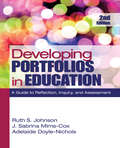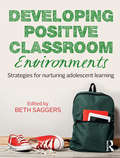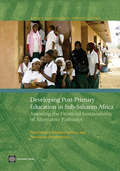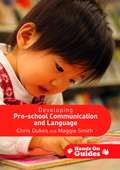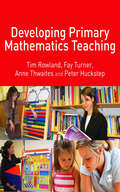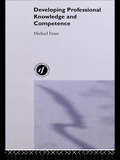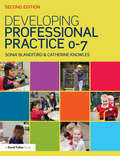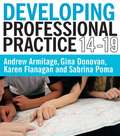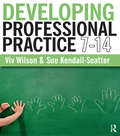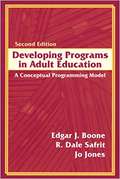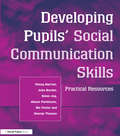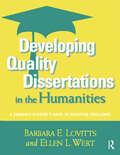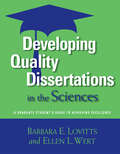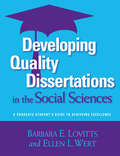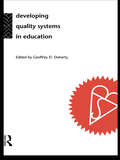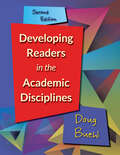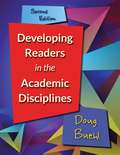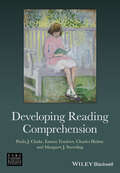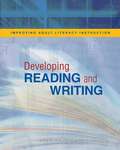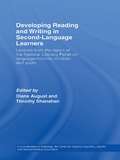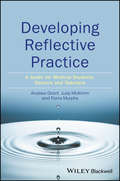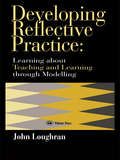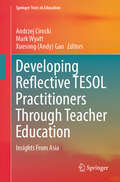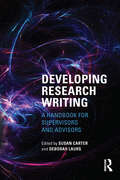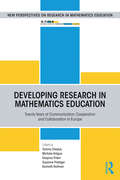- Table View
- List View
Developing Portfolios in Education: A Guide to Reflection, Inquiry, and Assessment
by Ruth S. Johnson J. (Joan) Mims-Cox Adelaide R. Doyle-NicholsDeveloping Portfolios in Education, Second Edition, walks teachers through the practical aspects of creating portfolios and demonstrates how they can be used as an action research tool for reflection and professional development. Authors Ruth S. Johnson, J. Sabrina Mims-Cox, and Adelaide Doyle-Nichols include checklists, visuals, organizational strategies, and hands-on tools to help readers through every step of developing a professional portfolio. Key Features Emphasizes the role of standards as they apply to portfolio content and evaluation Includes chapter-opening scenarios that offer real-world examples of portfolio development New to This Edition Presents a chapter that links portfolio development to action research Contains updated material on electronic portfolio development Provides new step-by-step descriptions of the portfolio process written specifically for teachers Accompanying Student Resources on CD provide video clips of portfolio presentations, sample electronic portfolios for elementary and secondary teaching credential candidates, PowerPoint slides, tables, templates, and links to Web sites.
Developing Positive Classroom Environments: Strategies for nurturing adolescent learning
by Beth SaggersThe middle years of learning are increasingly recognised as one of the most challenging yet opportune periods for growth and development. Based on the Positive Behaviour Support (PBS) framework, this book will equip educators with the appropriate knowledge, skills and strategies to support learners in maximising their educational success, managing emotional issues and making a successful transition to adulthood. Part A outlines the principles of the PBS framework, defines key characteristics of middle-years learners and provides insight from neuroscience into the nature of the adolescent brain. This section also looks at the importance of listening to the student voice, highlights issues that can arise during the transition into the middle years of schooling, and discusses the use of evidence-based PBS practices to encourage engagement and establish clear behavioural expectations with learners. Part B focuses on the practical aspects of implementing universal PBS strategies in the classroom, including developing strong and effective relationships with students, promoting school connectedness and supporting self-regulation. Part C examines more focused and intensive interventions, and provides strategies for working with students experiencing stress, anxiety and bullying. Finally, Part D discusses ways to support a range of perspectives and experiences in the middle-years, including trauma-affected students, ethnic and cultural diversity and students on the autism spectrum, as well as ways to use ICT to re-engage vulnerable students. This is an essential reference for both primary and secondary educators, revealing how PBS strategies can play a profound role in positively transforming classroom behaviour.
Developing Post-Primary Education in Sub-Saharan Africa
by Ramahatra Rakotomalala Alain Mingat Blandine LedouxCountries in Sub-Saharan Africa have made substantial progress in universalizing primary school completion. Many young Africans are completing primary schooling, and many more will do so in the coming years. The pressure-already strong-to expand secondary and tertiary education is expected to intensify. Finding a sustainable path for such expansion is a challenge for all countries in the region. Given the diversity across African countries, 'Developing Post-Primary Education in Sub-Saharan Africa: Assessing the Financial Sustainability of Alternative Pathways' offers no generic policy fix. Rather, it seeks to provide policy makers and their development partners with an analytical tool to inform discussion and debate about alternative options in light of country circumstances. It presents simulation scenarios that serve an illustrative function to draw attention to the implications of such options as raising the share of education in the national budget, reforming the service delivery arrangements to manage costs, diversifying the student flow beyond lower secondary education, and enlarging the role of private funding, particularly in post-primary education. The study captures the nature of the policy choices by presenting alternative packages of policies and using them to clarify the affordability of what the authors characterize as spartan and generous choices. One of the study's most valuable contributions is the flexibility of the simulation model, which can be used to adapt the package of policies to national contexts. 'Developing Post-Primary Education in Sub-Saharan Africa: Assessing the Financial Sustainability of Alternative Pathways', which contains detailed annexes with results for 33 low-income countries, will be of interest to national education policy makers and development partners, as well as education researchers and education consultants.
Developing Pre-School Communication and Language (Hands on Guides)
by Maggie Smith Chris DukesIncludes CD-Rom `This book is highly recommended for all practitioners interested in improving their practice in developing young children's communication and language. The ability to print material form the CD-Rom enables the information to be accessed by practitioners working with children of different ages in different rooms in a setting' - Early Years Update `A very clear and easy to read style of text. . . This book has a common sense approach to good practice. I thoroughly recommend this book to anyone wishing to develop this area of childminding work' - National Childminding Association `An excellent resource for all those working with young children. . . the ideas are tried and tested, user-friendly and research-based, and can be trusted and implemented with ease' - Early Years Educator `This book will be an invaluable support: a treasure-chest of superb resources, materials, ideas and suggestions for the busy early years practitioner who is keen to develop the language of the children in their care. The CD-ROM will save some of that precious time we all strive to expand, and the practical strategies offered will be a boon to practice in the setting' - Collette Drifte Looking for advice on how to develop communication and language skills in the pre-school? Packed with helpful advice on supporting and developing the crucial language and communication skills of the children in your early years setting, this book provides clear guidance on appropriate expectations for each age group between birth to five. The book includes: - advice on how to support language development in all children, including those with special educational needs - practical ideas and strategies for practitioners and parents - guidance on when to seek advice and working with other professionals - activities and case studies - a CD Rom with useful photocopiable resources. This book is ideal for all those working with the 0 to 5 age range, such as pre-school practitioners, nursery managers, advisory teachers, SENCOs, Inclusion Officers and Child Care and Education students and tutors. Chris Dukes and Maggie Smith are both Area SENCOs who work closely with pre-school SENCOs and Managers on a daily basis.
Developing Primary Mathematics Teaching: Reflecting on Practice with the Knowledge Quartet
by Fay Turner Tim Rowland E Anne Thwaites Peter HuckstepHow can KS1/2 teachers improve their mathematics teaching? This book helps readers to become better, more confident teachers of mathematics by enabling them to focus critically on what they know and what they do in the classroom. Building on their close observation of primary mathematics classrooms, the authors provide those starting out in the teaching profession with a four-stage framework which acts as a tool of support for developing their teaching: - making sense of foundation knowledge - focusing on what teachers know about mathematics - transforming knowledge - representing mathematics to learners through examples, analogies, illustrations and demonstrations - connection - helping learners to make sense of mathematics through understanding how ideas and concepts are linked to each other - contingency - what to do when the unexpected happens Each chapter includes practical activities, lesson descriptions and extracts of classroom transcripts to help teachers reflect on effective practice.
Developing Professional Knowledge And Competence
by Michael ErautThis volume analyzes different types of knowledge and know-how used by practising professionals in their work and how these different kinds of knowledge are acquired by a combination of learning from books, learning from people and learning from personal experience.; Drawing on various examples, problems addressed include the way theory changes and is personalized in practice, and how individuals form generalizations out of their practice. Eraut considers the meaning of client-centredness and its implications, and to what extent professional knowledge is based on intuition, understanding and learning. He considers the issue of competence versus knowledge and the effect of lifelong learning on the quality of practice.
Developing Professional Practice 0-7
by Sonia Blandford Catherine KnowlesDeveloping Professional Practice 0-7 provides a thoroughly comprehensive and cutting edge guide to developing the understanding and practical skills necessary for working within early years education. The new edition is fully updated for the revised Early Years Foundation Stage Statutory Framework. The updated edition covers all core topics associated with developing effective professional practice, including leadership and management, personalised learning and continuing professional development. There is also a strong focus on parent/carer engagement, setting accountability for the lowest attaining groups, the parent/carer and child voice in education, transition, SEND reform, early intervention, and developing leadership at all levels including as a business model. Readers can explore in-depth issues, and take ownership of them, by applying theory to real practice in schools and early years settings. Chapter contents are directly linked to the Early Years Teacher Standards, providing a clear understanding of how the content relates to competencies and allowing readers to reflect critically on best practice. Discussion points and case studies further connect theory to practice and offer a genuinely accessible and engaging introduction to supporting the education of babies, toddlers and young children.? This vibrant, dynamic and interactive approach uses examples of real practice, along with a range of additional features tailored to support the reader in developing their knowledge, skills and understanding. Developing Professional Practice 0-7 is essential reading for anyone training to work in the early years, and an invaluable resource for all those already in the early stages of their careers.
Developing Professional Practice 14-19
by Andy Armitage Gina Donovan Karen Flanagan Sabrina PomaThe Developing Professional Practice series provides a thoroughly comprehensive and cutting edge guide to developing the necessary knowledge, skills and understanding for teaching within the 0-7, 7-14 or 14-19 age ranges. Each of the three titles offers a genuinely accessible and engaging introduction to a wide range of professional practice supporting the education of babies to young adults. Discussion of current developments in theory, policy and research is combined with guidance on the practicalities of working with each age group. Numerous examples of real practice are included throughout, along with a range of additional features to help promote understanding.
Developing Professional Practice 7-14
by Viv Wilson Sue Kendall-SeatterDeveloping Professional Practice 7-14 provides a thoroughly comprehensive and cutting edge guide to developing the necessary knowledge, skills and understanding for teaching within the 7-14 age range. This book is designed to guide you through your initial teacher training programme, and on into the early stages of your career, with the aim of stimulating and supporting you in the process of developing your practice.A range of pedagogical features are provided in each chapter to encourage reflection, interaction and debate. Over to you features pose questions that will encourage you to examine your own knowledge, understanding and practical skills. Working in the Classroom features will help you to envisage how the material covered might impact on your classroom practiceCase studies offer extended examples that help illustrate core concepts and theories in action. Controversy features provide in-depth discussion of issues that are ongoing causes for debateResearch briefing boxes explore recent research studies, and explain their bearing on day to day practiceAdditional resources and support are provided via the Developing Professional Practice companion website, www.pearsoned.co.uk/7-14, where you can access additional self-study questions, case studies, interactive chapter-by-chapter tutorials, interviews with practitioners and students, and a glossary of key terms. Developing Professional Practice 7-14 is essential reading for anyone training to teach in primary or secondary schools, as well as those specialising in the middle years specifically. It will also prove an invaluable resource for all those already in the early stages of their careers.
Developing Programs in Adult Education: A Conceptual Programming Model
by Jo Jones; R. Dale Safrit; Edgar J. BooneThe Second Edition of Developing Programs in Adult Education will serve as an indispensable guide for current and prospective adult educators in planning, designing/implementing, and evaluating/accounting for adult education programs. Like the successful First Edition, this revised and expanded volume presents a conceptual programming model that draws from many concepts, constructs, and theories generated by adult educators and other scholars in closely allied disciplines. The updated model, field tested and validated, enhances and elaborates on the complex contextual relationships and processual actions represented in the original. The authors offer illustrative applications within varied organizational contexts and provide a panorama of both macro- and micro-perspectives and actions of a program planning process, with examples from various fields of adult education practice. This innovative text is the definitive authority on one of the few theoretical models of the programming process based in systems theory merged with the practice ecology of adult education.
Developing Pupils Social Communication Skills: Practical Resources
by George Thomas Penny Barratt Julie Border Helen Joy Alison Parkinson Mo PotterLearning to communicate with other people is perhaps the most important learning children do. Children with social communication problems may have trouble picking up the crucial skills of interacting and communicating with their peers, which can have more serious implications later on in life. This resource will help teachers, teaching assistants and therapists to develop and improve the social skills of their younger pupils; provides sets of easily accessible, verbal and non-verbal games and activities to encourage social interaction; provides a clear rationale to the games to help the teacher or teaching assistant really get to grips with how and why these activities can help; provides a structured approach to pupils' social development for pupils in their early and primary years which has been tried, tested and proved to be effective; and includes assessment forms and monthly and daily planning sheets
Developing Quality Dissertations in the Humanities: A Graduate Student's Guide to Achieving Excellence
by Barbara E. Lovitts Ellen L. WertThis is one of three short booklets designed to be given to graduate students as they begin their studies. These booklets explain the purposes of the dissertation and the criteria by which it will be assessed. They help students understand the context of their course work; the need to take an active role in shaping their studies; and the importance of thinking ahead about the components of the dissertation and the quality of scholarship they will need to demonstrate.These booklets are intended to support the dissertation research and writing process by providing faculty and advisors with guidelines for setting clear expectations for student performance, and with a model for helping students produce the desired quality of work. They encourage dialogue between faculty and students about the quality of the components of their dissertation project. They include rubrics that students can use to self-assess their work and that can aid faculty in providing focused feedback.Setting explicit targets and benchmarks of excellence of the sort advocated in these booklets will enable departments and universities to respond to demands for accountability with clear criteria for, and evidence of, success; and will raise the overall quality of student performance.
Developing Quality Dissertations in the Sciences: A Graduate Student's Guide to Achieving Excellence
by Barbara E. Lovitts Ellen L. WertThis is one of three short booklets designed to be given to graduate students as they begin their studies. They explain the purposes of the dissertation and the criteria by which it will be assessed. They help students understand the context of their course work; the need to take an active role in shaping their studies; and the importance of thinking ahead about the components of the dissertation and the quality of scholarship they will need to demonstrate.These booklets are intended to support the dissertation research and writing process by providing faculty and advisors with guidelines for setting clear expectations for student performance, and with a model for helping students produce the desired quality of work. They encourage dialogue between faculty and students about the quality of the components of their dissertation project. They include rubrics that students can use to self-assess their work and that can aid faculty in providing focused feedback.Setting explicit targets and benchmarks of excellence of the sort advocated in these booklets will enable departments and universities to respond to demands for accountability with clear criteria for, and evidence of, success; and will raise the overall quality of student performance.
Developing Quality Dissertations in the Social Sciences: A Graduate Student's Guide to Achieving Excellence
by Barbara E. Lovitts Ellen L. WertThis is one of three short booklets designed to be given to graduate students as they begin their studies. They explain the purposes of the dissertation and the criteria by which it will be assessed. They help students understand the context of their course work; the need to take an active role in shaping their studies; and the importance of thinking ahead about the components of the dissertation and the quality of scholarship they will need to demonstrate.These booklets are intended to support the dissertation research and writing process by providing faculty and advisors with guidelines for setting clear expectations for student performance, and with a model for helping students produce the desired quality of work. They encourage dialogue between faculty and students about the quality of the components of their dissertation project. They include rubrics that students can use to self-assess their work and that can aid faculty in providing focused feedback.Setting explicit targets and benchmarks of excellence of the sort advocated in these booklets will enable departments and universities to respond to demands for accountability with clear criteria for, and evidence of, success; and will raise the overall quality of student performance.
Developing Quality Systems in Education
by Geoffrey D. DohertyEducational institutions have not escaped the influence of the quality movement, and the FE sector in particular is now being actively encouraged to introduce the BSI's quality assurance standard BS5750. Universities and schools are also attracted by a standard which should improve, if not quality itself, then the management of quality. This book presents an overview of the pitfalls and problems of implementing quality standards in education. It explores theoretical issues, such as the relationship between the customer and academic culture. It also has a strong practical theme, looking at the advantages and disadvantages of quality systems, case studies of attempts at implementation and proposals for future developments across the education sector as a whole.
Developing Readers in the Academic Disciplines
by Doug BuehlBeing literate in an academic discipline is more than being able to read and comprehend text; you can think, speak, and write as a historian, scientist, mathematician, or artist. Author Doug Buehl strips away the one-size-fits-all approach to content area literacy and presents an instructional model for disciplinary literacy, which honors the discipline and helps students learn within that area. In this revised second edition, Developing Readers in the Academic Disciplines shows how to help students adjust their thinking to comprehend a range of complex texts that fall outside their reading comfort zones. Inside you'll find: Instructional tools that adapt generic literacy practices to discipline-specific variationsStrategies for frontloading instruction to activate and build background knowledgeNew approaches for encouraging inquiry around disciplinary textsIn-depth exploration of the role of argumentation in informational textNumerous examples from science, mathematics, history and social studies, English/language arts, and related arts to show you what vibrant learning looks like in various classroom settings Designed to be a natural companion to Buehl's Classroom Strategies for Interactive Learning, Developing Readers in the Academic Disciplines introduces teachers from all disciplines to new kinds of thinking and, ultimately, teaching that helps students achieve new levels of understanding.
Developing Readers in the Academic Disciplines (2nd Edition)
by Doug Buehl<p>Being literate in an academic discipline means more than simply being able to read and comprehend text; it means you can think, speak, and write as a historian, scientist, mathematician, or artist. Doug Buehl strips away the one-size-fits-all approach to content area literacy and presents a much-needed instructional model for disciplinary literacy, showing how to mentor middle and high school learners to become "academic insiders" who are college and career ready. <p>This thoroughly revised second edition of Developing Readers in the Academic Disciplines shows how to help students adjust their thinking to comprehend a range of complex texts that fall outside their reading comfort zones. This book --a natural companion to Buehl's Classroom Strategies for Interactive Learning, which has been bolstering student comprehension for almost three decades--provides the following supports for teachers: <p> <li>Instructional tools that adapt generic literacy practices to discipline-specific variations <li>Strategies for frontloading instruction to activate and build background knowledge <li>New approaches for encouraging inquiry around disciplinary texts <li>In-depth exploration of the role of argumentation in informational text <li>Numerous examples from science, mathematics, history and social studies, English/language arts, and related arts to show you what vibrant learning looks like in various classroom settings</li> <p> <p>Developing Readers in the Academic Disciplines introduces teachers from all disciplines to new kinds of thinking and, ultimately, teaching that helps students achieve new levels of understanding.
Developing Reading Comprehension
by Charles Hulme Emma Truelove Margaret J. Snowling Paula J. ClarkePresents cutting-edge, evidence-based interventions for dealing with specific difficulties of reading comprehension in children aged 7-11. An in-depth introduction to the ‘poor comprehender profile’, which describes children who despite being fluent readers have difficulty extracting meaning from text. Sets out a range of practical interventions for improving reading skills in this group - along with comprehensive guidance on assessment and monitoring, and insightful accounts of professionals’ experience in delivering the techniques described. Includes an overview of psychological theories of reading comprehension, evaluating their practical applicability.
Developing Reading and Writing
by M. ChiangMore than an estimated 90 million adults in the United States lack the literacy skills needed for fully productive and secure lives. The effects of this shortfall are many: Adults with low literacy have lower rates of participation in the labor force and lower earnings when they do have jobs, for example. They are less able to understand and use health information. And they are less likely to read to their children, which may slow their children's own literacy development. At the request of the U. S. Department of Education, the National Research Council convened a committee of experts from many disciplines to synthesize research on literacy and learning in order to improve instruction for those served in adult education in the U. S. The committee's report, Improving Adult Literacy Instruction: Options for Practice and Research, recommends a program of research and innovation to gain a better understanding of adult literacy learners, improve instruction, and create the supports adults need for learning and achievement. Improving Adult Literacy Instruction: Developing Reading and Writing, which is based on the report, presents an overview of what is known about how literacy develops the component skills of reading and writing, and the practices that are effective for developing them. It also describes principles of reading and writing instruction that can guide those who design and administer programs or courses to improve adult literacy skills. Although this is not intended as a "how to" manual for instructors, teachers may also find the information presented here to be helpful as they plan and deliver instruction.
Developing Reading and Writing in Second-Language Learners: Lessons from the Report of the National Literacy Panel on Language-Minority Children and Youth. Published by Routledge for the American Association of Colleges for Teacher Education
by Timothy Shanahan Diane AugustA Co-Publication of Routledge, the Center for Applied Linguistics, and the International Reading Association This book is a shorter version of Developing Literacy in Second-Language Learners, reporting the findings of the National Literacy Panel on Language-Minority Children and Youth. This book concisely summarizes what is known from empirical research about the development of literacy in language-minority children and youth, including development, environment, instruction, and assessment. This more accessible version of the full report is intended for teachers, administrators, and researchers and for use in a wide range of teacher preparation courses and in inservice/ staff development programs that deal with educating English language learners. Visit www.reading.org for more information about IRA books, membership, and other services. Visit www.cal.org to learn more about the Center for Applied Linguistics.
Developing Reflective Practice: A Guide for Medical Students, Doctors and Teachers
by Judy Mckimm Fiona Murphy Andy GrantThe ability to reflect on practice is a fundamental component of effective medical practice. In a sector increasingly focused on professionalism and patient-centred care, Developing Reflective Practice is a timely publication providing practical guidance on how to acquire the reflective skills necessary to become a successful clinician. This new title draws from a wide range of theoretical and practical multidisciplinary perspectives to assist students, practitioners and educators in embedding reflection in everyday activities. It also offers structures and ideas for more purposeful and meaningful formal reflections and professional development. Developing Reflective Practice: Focuses on the developing practitioner and their lifelong learning and the development of professional identity through reflection Provides practical how-to information for students, practitioners and educators, including realistic case examples and practice-based hints and tips Examines and explains the theoretical and conceptual approaches to reflective practice, including its models and frameworks.
Developing Reflective Practice: Learning About Teaching And Learning Through Modelling
by J. John LoughranThis text presents a research study into the development of reflective practitioners in a pre-service teacher education programme. The teacher educator in the study modelled his own reflections on practice in the hope that it would help students to apply reflection to their own teaching.; The results of the author's research demonstrate that reflection on practice occurs in three distinct periods: before anticipatory, during contemporaneous and after retrospective a pedagogical experience. The book concludes that when student teachers' own learning situations, both within their university coursework and their school experiences, become the focus for their learning about teaching and learning, their understanding of, and practice in, teaching is enhanced.
Developing Reflective TESOL Practitioners Through Teacher Education: Insights From Asia (Springer Texts in Education)
by Xuesong Andy Gao Andrzej Cirocki Mark WyattThis textbook provides insights from Asian contexts into how reflective practice is nurtured on Teaching English to Speakers of Other Languages (TESOL) and English Language Teaching (ELT) teacher education programmes. There is increasing recognition worldwide that, given the centrality of reflective practice to teachers’ ongoing professional development, supporting teachers to become reflective practitioners should be integral to teacher education programmes. Consequently, tertiary-level courses in areas such as TESOL and ELT tend to promote reflective practice, supported by theoretical input from the burgeoning literature on reflection, much of which is produced in the West. Relatively under-represented in the literature are global perspectives on reflective practice; there are consequently relatively few accounts as to how reflective practice is embedded in teacher education programmes in different parts of the world, including Asia. Hence, this book addresses a gap. Contributing authors from fourteen countries provide insights into the ways in which teachers are helped to grow as reflective practitioners on their teacher education programmes in their unique contexts. This textbook showcases how reflective teaching practices are developed, supported by frameworks for critical reflection and in interaction with local educational policies. These distinctive accounts aid readers in reflecting on the ways in which reflective practice is supported in their own teacher education contexts and in considering ways of enhancing the reflective dimension of their programmes. This textbook showcases innovative reflective activities and can be used as a principal text or as supplemental reading on a range of TESOL and ELT teacher education courses.
Developing Research Writing: A Handbook for Supervisors and Advisors
by Susan Carter and Deborah LaursDeveloping Research Writing is designed to encourage, inspire and improve the advisory practice of providing writing feedback. This book provides insights and advice that supervisors can use to advance their support of their research students’ writing and, at the same time, survive increasing supervisory demands. Book parts are framed by empirical supervisor and doctoral student experiences and chapters within each part provide multiple approaches. The carefully chosen contributors are specialists on research writing and doctoral pedagogy, who guide the reader through the key stages of providing feedback. Split into nine key parts the book covers: starting a new supervision with writing in focus; making use of other resources along the way; encouraging style through control of language; writing feedback on English as an Additional Language (EAL) writing; Master’s and Honours smaller projects’ writing feedback; thesis by publication or performance-based writing; maintaining and gathering momentum; keeping the examiner happy; writing feedback as nudging through identity transition. The parts cohere into a go-to handbook for developing the supervision process. Drawing on research, literature and experience, Developing Research Writing offers well-theorized, yet practical and grounded advice conducive to good practices.
Developing Research in Mathematics Education: Twenty Years of Communication, Cooperation and Collaboration in Europe (European Research in Mathematics Education)
by Kenneth Ruthven Tommy Dreyfus Susanne Prediger Despina Potari Michèle ArtigueDeveloping Research in Mathematics Education is the first book in the series New Perspectives on Research in Mathematics Education, to be produced in association with the prestigious European Society for Research in Mathematics Education. This inaugural volume sets out broad advances in research in mathematics education which have accumulated over the last 20 years through the sustained exchange of ideas and collaboration between researchers in the field. An impressive range of contributors provide specifically European and complementary global perspectives on major areas of research in the field on topics that include: the content domains of arithmetic, geometry, algebra, statistics, and probability; the mathematical processes of proving and modeling; teaching and learning at specific age levels from early years to university; teacher education, teaching and classroom practices; special aspects of teaching and learning mathematics such as creativity, affect, diversity, technology and history; theoretical perspectives and comparative approaches in mathematics education research. This book is a fascinating compendium of state-of-the-art knowledge for all mathematics education researchers, graduate students, teacher educators and curriculum developers worldwide.
